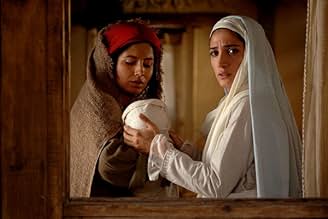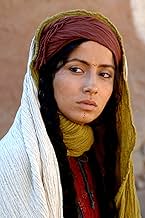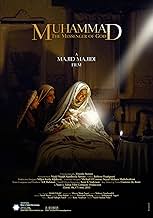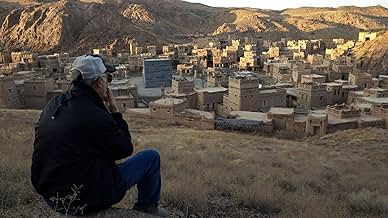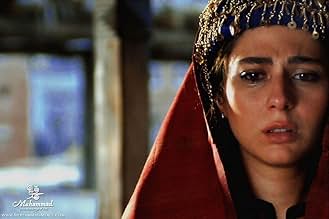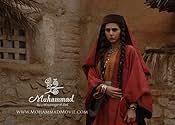IMDb रेटिंग
7.2/10
13 हज़ार
आपकी रेटिंग
7वीं शताब्दी ईस्वी में मक्का शहर की घटनाएँ, परीक्षाएँ और क्लेश.7वीं शताब्दी ईस्वी में मक्का शहर की घटनाएँ, परीक्षाएँ और क्लेश.7वीं शताब्दी ईस्वी में मक्का शहर की घटनाएँ, परीक्षाएँ और क्लेश.
- निर्देशक
- लेखक
- स्टार
- पुरस्कार
- 1 जीत और कुल 2 नामांकन
Baharak Salehniya
- Thowaiba
- (as Baharak Saleh Nia)
फ़ीचर्ड समीक्षाएं
Muhammad: The Messenger of God (2015) is an Iranian film written and directed by Majid Majidi. Cinematography was by Vittorio Storaro. Dryden Theatre of Rochester's George Eastman Museum has been honoring Vittorio Storaro, and that's how we were able to to see this movie. (The DVD was Storaro's own personal copy.)
Another reviewer has called this film, "A must-see feast of beautiful colors and tunes." That is absolutely correct. The screen is filled with color and action. The music is beautiful. The acting is outstanding. (We are never shown Muhammad's face, out of respect for Islamic tradition.) We see elephants, camels, horses, and sheep. Director Majidi gives us (literally) a cast of thousands. The desert scenery is spectacular.
Everything works, except that the actual facts about Muhammad's childhood are scarce. Director Majidi concentrates on miracles that Muhammad performs as a child. I've read a fair amount about Islam, and I've never seen any emphasis placed on Muhammad having supernatural powers when he was young. Muhammad was an orphan, and his life was challenging. Some of what was shown is probably historically correct, but I think most of it arose in the mind of writer Majidi.
One major problem for me is that the film is virulently anti-Semitic. As I understand it, Jews weren't involved in Muhammad's life. He accepted the God of Abraham, and he is considered by Muslims to be that God's true and last prophet. However, any violence he encountered was from opposing tribes, not from Jews. Maybe director Majidi is anti-Semitic. My guess is that this was the price he had to pay for the freedom to make this film in Iran.
The movie is three hours long. The good news is that it was never boring. The bad news is that it may have only a tangential bearing on the life of the Prophet Muhammad.
Another reviewer has called this film, "A must-see feast of beautiful colors and tunes." That is absolutely correct. The screen is filled with color and action. The music is beautiful. The acting is outstanding. (We are never shown Muhammad's face, out of respect for Islamic tradition.) We see elephants, camels, horses, and sheep. Director Majidi gives us (literally) a cast of thousands. The desert scenery is spectacular.
Everything works, except that the actual facts about Muhammad's childhood are scarce. Director Majidi concentrates on miracles that Muhammad performs as a child. I've read a fair amount about Islam, and I've never seen any emphasis placed on Muhammad having supernatural powers when he was young. Muhammad was an orphan, and his life was challenging. Some of what was shown is probably historically correct, but I think most of it arose in the mind of writer Majidi.
One major problem for me is that the film is virulently anti-Semitic. As I understand it, Jews weren't involved in Muhammad's life. He accepted the God of Abraham, and he is considered by Muslims to be that God's true and last prophet. However, any violence he encountered was from opposing tribes, not from Jews. Maybe director Majidi is anti-Semitic. My guess is that this was the price he had to pay for the freedom to make this film in Iran.
The movie is three hours long. The good news is that it was never boring. The bad news is that it may have only a tangential bearing on the life of the Prophet Muhammad.
Majidi is a king within the realm of art film, and he sure faced immense challenges managing the first Iranian cinematic project of this scale. The film immerses the audience in an orchestra of beautiful colors, Majidi's specialty, and an outpouring of sublime tunes. Juxtaposed with masterful cinematography of Storaro (although occasionally overdone), Majidi delivers imagery that satisfies aesthetic palates superbly.
The historical period drama, said to be the first part of a trilogy, focuses on prophet Muhammad's childhood. It is of note that, the filmmaker, working within the confines of Islamic conventions, cannot show Muhammad's face, which undeniably renders the project formidable. Hence, the point of view must be shifted, the story must unfold from distributed viewpoints, that must gel together skillfully in order to retain coherence. Though the story does justice vis-à-vis this challenge, it is far from perfection; the script does not mesh well with the visual artistry. The second act is stale, and the last act, though adequate, could be substantially improved. The CGI was noticeably weak; understandable, since it was the very first experience Iranian cinema went through, but still, within the given bounds, could be trimmed down and could easily be improved significantly. This evinces an odd feature of this film: the sense of perfectionism in this film is oddly inconsistent; some parts are perfected masterfully with amazing care, and a few are not even average. In addition to the CGI, the voice of Muhammad is an illustrative example: letting alone professional actors, I am sure that even among Iranian children doing TV commercials there are who are by far better voice actors, both in terms of enunciation and acting, than the kid chosen in this film for the role of Muhammad. What happened to the sense of perfection of the whole team there, I am not sure.
The film strives towards Shia-Sunni neutrality, and succeeds remarkably---unless viewed with absolute cynicism (anything can be deemed as biased if viewed from that lens). The focus is predominantly on the commonalities of the Shia-Sunni accounts, and the chosen story time---Muhammad's childhood---is certainly helpful towards that end. All in all, the film can be best characterized as "promising" (especially when held against the technological status quo of the Iranian cinema) regarding the potentials of cinema for engendering harmony and peace in our ominous and volatile times. It is definitely a must-see.
The historical period drama, said to be the first part of a trilogy, focuses on prophet Muhammad's childhood. It is of note that, the filmmaker, working within the confines of Islamic conventions, cannot show Muhammad's face, which undeniably renders the project formidable. Hence, the point of view must be shifted, the story must unfold from distributed viewpoints, that must gel together skillfully in order to retain coherence. Though the story does justice vis-à-vis this challenge, it is far from perfection; the script does not mesh well with the visual artistry. The second act is stale, and the last act, though adequate, could be substantially improved. The CGI was noticeably weak; understandable, since it was the very first experience Iranian cinema went through, but still, within the given bounds, could be trimmed down and could easily be improved significantly. This evinces an odd feature of this film: the sense of perfectionism in this film is oddly inconsistent; some parts are perfected masterfully with amazing care, and a few are not even average. In addition to the CGI, the voice of Muhammad is an illustrative example: letting alone professional actors, I am sure that even among Iranian children doing TV commercials there are who are by far better voice actors, both in terms of enunciation and acting, than the kid chosen in this film for the role of Muhammad. What happened to the sense of perfection of the whole team there, I am not sure.
The film strives towards Shia-Sunni neutrality, and succeeds remarkably---unless viewed with absolute cynicism (anything can be deemed as biased if viewed from that lens). The focus is predominantly on the commonalities of the Shia-Sunni accounts, and the chosen story time---Muhammad's childhood---is certainly helpful towards that end. All in all, the film can be best characterized as "promising" (especially when held against the technological status quo of the Iranian cinema) regarding the potentials of cinema for engendering harmony and peace in our ominous and volatile times. It is definitely a must-see.
This is the first time i write a review in this website, i was so excited after seeing the movie that i really wanted to share my joy with you. I saw the movie yesterday in cinema of Iran, it was really great. The cinematic were incredible. The musics used on the film (by A.R.Rahman ) bring it to the next level! I was a fan of Hobbit and Lord before this movie, but i can tell you that this movie in almost all aspect is as good as them with a simple difference which is that the history behind it is totally true! that makes a really great feeling specially for Muslims. I cried in a lot of scenes of it and goosebumps in the miracles scenes. I repeat that the best positive point of the movie is the music which has been successfully joined with the film.
Sorry for my bad English.
Sorry for my bad English.
10hlogun
This is what i call an "Epic" movie . you might say well , meh , this guy is Iranian and after all this movie is Iranian too . i could edit my location to any other place and you wouldn't know , but here is the point : seldomly i like a movie to a point that i cry . this movie made me cry .
as the first part of a trilogy , it perfectly balances itself not to cross any line in regards to both "Sunni" and "Shia" sects . Majid majidi for me is the Christopher Nolan of Iran . only 8 years after his last movie , he has once again astonished his fans with a touching and aspiring movie .
ALCON , this movie is well capable of wiping the floor with other movies in all international events .
This is the most expensive and sophisticated movie any Muslim country has ever created and i hope it can effectively show the real side of Islam to foreign audience .
A.R Rahman and the great staff only add to the greatness of this movie .
my Rate : 10
as the first part of a trilogy , it perfectly balances itself not to cross any line in regards to both "Sunni" and "Shia" sects . Majid majidi for me is the Christopher Nolan of Iran . only 8 years after his last movie , he has once again astonished his fans with a touching and aspiring movie .
ALCON , this movie is well capable of wiping the floor with other movies in all international events .
This is the most expensive and sophisticated movie any Muslim country has ever created and i hope it can effectively show the real side of Islam to foreign audience .
A.R Rahman and the great staff only add to the greatness of this movie .
my Rate : 10
OMG THIS IS Absolutely BEST THING I EVER SEEN THAt before IN Islamic FILMS AND PROPHETs FILMS . music show u that hot sands and local people of that time and that region . it makes u too feel correct meaning of director ! this is for muhammad prophet kindly and show muhammad's mercy for people. all of people. decors was so nice and correct for that time,i enjoyed ! casts too ! i hope this trilogy can be one of the best movies we seen that before ! Hollywood CANT MAKE LIKE THIS POEM FILM ,NEVER. director made this film by his heart and love of muhammad and transport it to viewer. CONGRATULATION TO MAJID MAJIDI TO introduce MUHAMMAD PROPHET SUCCESSFULLY.
क्या आपको पता है
- ट्रिवियाThis movie will be part of a trilogy. Muhammad will never be shown in any of the three films for the respect of his character. This is specifically done in all media in Islam countries to avoid idolization of a renown character to an actor's face. Instead, he is meant to be known by his religious and historical personality profile.
- भाव
Abdul Muttalib: There is nothing futile in the sight of God.
टॉप पसंद
रेटिंग देने के लिए साइन-इन करें और वैयक्तिकृत सुझावों के लिए वॉचलिस्ट करें
- How long is Muhammad: The Messenger of God?Alexa द्वारा संचालित
विवरण
बॉक्स ऑफ़िस
- बजट
- IRR 1,20,00,00,00,000(अनुमानित)
- दुनिया भर में सकल
- $14,40,044
- चलने की अवधि2 घंटे 42 मिनट
- रंग
- ध्वनि मिश्रण
- पक्ष अनुपात
- 2.00 : 1
इस पेज में योगदान दें
किसी बदलाव का सुझाव दें या अनुपलब्ध कॉन्टेंट जोड़ें



